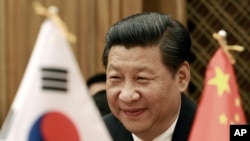Chinese President Xi Jinping has denounced what he called Japan's "barbaric" colonial aggression against China and Korea as he continues his two-day visit to Seoul.
During a speech Friday at Seoul National University, Xi said Chinese and South Koreans experienced "enormous suffering" as a result of Japan's imperial aggression in the first half of the 20th century.
The comments come a day after Xi offered to hold joint memorial activities with South Korea to mark next year's 70th anniversary of Japan's defeat in World War II.
South Korea and China were two of the biggest victims of Japanese imperialism. Both countries also have separate modern-day territorial disputes with Japan and are concerned with Tokyo's attempts to expand the role of its military.
Many observers see Xi's trip to South Korea, his first since taking office, as part of an attempt by Beijing to bring Seoul closer into its sphere of influence and thereby alienate Japan.
On Thursday, Xi and South Korean President Park Geun-hye agreed to expand the already robust ties between their two economies.
At a joint news briefing with Xi, Park said Seoul and Beijing will work to complete a long-negotiated free trade agreement by the end of the year.
Seoul's Finance Ministry also said the two sides agreed to introduce direct trading between the South Korean won and the Chinese yuan, a measure that will expand the use of China's currency.
The yuan joins the dollar as the only currency directly convertible with the won.
President Park also said she agreed with Xi the Korean peninsula should be denuclearized and they "resolutely" oppose further nuclear tests by North Korea.
Before the trip, China's Communist Party-run Global Times hailed South Korea as being an "exemplar of good neighbor relations." The editorial said ties have been "particularly thriving" amid what it called an "intricate and complex" situation in Northeast Asia.










